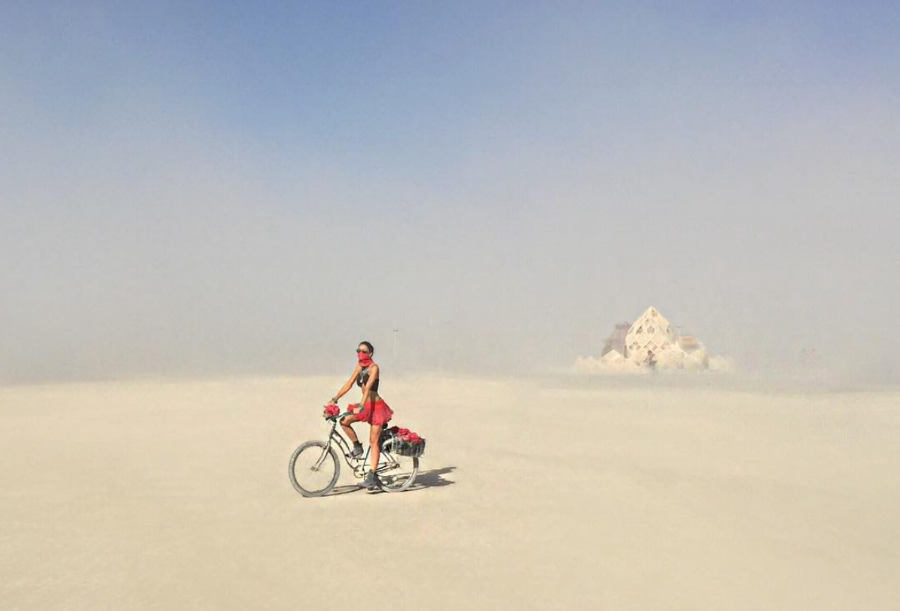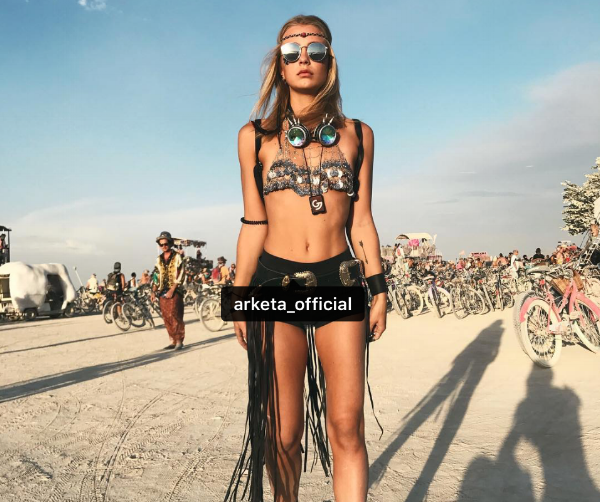 image: Instagram
image: Instagram
As the fashion industry is readying for the start of the Spring/Summer 2019 runway shows, which kick off in New York, next month, fashion industry influencers, Hollywood starlets, Victoria’s Secret models, and others are descending upon the Nevada desert, for Burning Man.
The week-long event, which routinely draws from the fashion crowd, differs from the average festival, in part, due to its collective, money-less bartering system among attendees. Moreover, unlike the year’s biggest music festivals, Burning Man lacks an organized line-up of musicians. As the festival – err “community’s” – website notes, “We don’t book acts or provide entertainment. What happens here is up to you! There is no corporate sponsorship. You are entering a ‘decommodified’ space that values who you are, not what you have.”
As a result, a typical day might involve anything from “biking between huge sculptures and experiencing the provisions of different camps to dancing all night to booming DJ sets surrounded by people in LED-adorned costumes,” per TechCrunch.
In addition to the influx of fashion folk, recent years have seen mainstream media outlets and tech giants, alike, jetting in. Mark Zuckerberg and Amazon’s Jeff Bezos have pitched up in luxury camps in recent years. Also in the mix: SoundCloud CEO Alex Ljung, Elon Musk and Eric Schmidt, executive chairman of Google’s parent company Alphabet, among many others. For Schmidt, these types of festivals are a business opportunity. “The future’s driven by people with an alternative world view. You never know where you’ll find ideas,” he told the Guardian last year.
Much like how these “top-league networking and business folks are all here in the guise of having fun. It’s designed around the music, but it’s about the business,” says Russell Ward, the general show runner responsible for an array of festivals. “A ton of business will get done here. Entrepreneurs will get funded, investors will find their trajectories, service companies will meet and mix it up,” he says.
The same is true for fashion. Yet, it is not what you would normally expect from a desert party – the closet example being Coachella, with its huge array of brand-sponsored parties, including e-commerce site Revolve’s heavily-Instagrammed #RevolveFestival, which was complete with live music, endless drinks and swimming, and big-name influencers (busy Instagramming the site’s hashtag and wearing Revolve-offered clothing sans #ad). H&M, Levi’s, Popsugar and Victoria’s Secret, among other brands with big advertising budgets, have all thrown similarly elaborate Coachella events, as well.
Revolve’s chief executive officer, Michael Mente, said that such efforts have significantly increased brand awareness – and sales. “Coachella has become as important to us as traditional holiday season,” Mente told WWD. “The week after weekend one [of Coachella] was our best sales week ever.”
Burning Man is an entirely different ball game, though – at least in theory. In line with its guiding principle of decommodification, buying goods or services for money is banned, as are product placements and advertisements. Attendees are even supposed to go so far as covering up the logos on everything they bring.
This makes traditional marketing difficult – but not impossible. LVMH-owned Krug Champagne, for instance, partnered with New York-based restaurant Fat Radish, to host an elaborate Burning Man dinner party in 2011. According to Burning Man Journal, “Krug’s PR agency pitched members of the media to photograph and report on the staged dinner for publications such as Town & Country and W magazines. They invited bloggers to the “exclusive” dinner … They pulled the dinner off entirely under the radar, had the dinner covered both by the mainstream media, and managed to get product placement articles published.”

Such large-scale promotional events are the exception, though (as they fall squarely outside of Burning Man’s mandatory community guidelines), and yet, trend analysts are busy calling Burning Man the “new Coachella” for brands. According to Trendalytics, a consumer-focused product intelligence platform, “Social actions have increased by over 200% during festival period in 2016 compared to 2015, with almost an 2,000% increase during the same period from 2014 to 2016 on Instagram alone.”
With that in mind, the opportunity for brands, it seems, stems from the fact that those Instagram photos are – many times – come complete with brand-specific tags, hashtags and other marketing/promotion-oriented efforts. Consider Russian street style star/influencer Lena Perminova’s posts – some of which were the most liked to bear the Burning Man hashtag. At least one contains a tag for Paris-based brand Chloe. One of model Jasmine Tookes’ photos features Snapchat’s spectacles front and center. Paris Hilton tagged a bunch of the brands whose garments she wore during the week in her Instagram photos, as did model Shanina Shaik and many others.
And even when not tagged, statement garments are on display in the increasing number of galleries dedicated to Burning Man style and Instagram photos from the week posted on sites ranging from Harper’s Bazaar to W.
In short: While brands may not be able to throw all-out sponsored events like they do for Coachella, many are finding ways to use this heavily-attended (and ever-growing) event as a means to market their brands and increase sales. And by relying almost exclusively on Instagram it seems that they might be doing so without directly infringing Burning Man’s no-marketing, no-promo rules.







